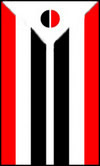Lesson Nineteen - Part One
Proximative and Obviative with Nouns
3rd and 4th Person in Arapaho
In Arapaho, instead of having only a third person form (‘he/she’), there is also a fourth person form (‘the other one’). Whenever two or more third persons are involved, a speaker has to choose one of them as the more important or ‘proximate’ person, and the others as less important, or ‘obviative’ persons. There are different verb endings for the obviatives:
| Singular | Plural | |
| 3rd person | -t | -3i' |
| 4th person | -ni3 | -ni3i |
Examples with cebísee- 'to walk' and ni'í3ecoo- 'to be happy':
| ceebíseet | He is walking. |
| ceebíseení3 | The other one is walking. |
| nii'í3ecóó3i | They are happy. |
| nii'í3ecooní3i | The other ones are happy. |
Moreover, the demonstrative 'this' has two forms: néhe' for proximates, and núhu' for obviatives (and inanimate things). Note that the proximate/obviative distinction is only used for animate objects.
So if you’re telling a story about two people, you might end up saying something like 'this one (main focus) is happy, but the other one is said.' In Arapaho, this would be:
| Néhe' | nii'í3ecoo-t, | 'oh | núhu' | teneení3ecoo-ní3. |
| This(prox) | happy-3, | but | this other(obv) | sad-4. |
Because of the markers on the verbs, there’s no need to use nouns or pronouns like in English. In Arapaho narrations, you will often have long strings of just verbs. There’s no problem for tracking who’s doing what though, because the proximate/obviative distinctions allow you to keep track of the different folks involved and their relation to each other. Here's a brief example:
| Néhe' nii'í3ecoo-t, 'oh núhu' teneení3ecoo-ní3. |
| This(prox) one is happy, but this other(obv) one is sad. |
| Núhu' yiihóo-ní3 hito'óowúúnin, 'oh néhe' yiihóó-t bii3hííno'óowúú'. |
| This other(obv) one is going to his house, but this(prox) one is going to a restaurant. |
| Beníí3i-t nisíkoc noh niiscíh'ebi-t. |
| He(prox) is eating cake and drink soft drinks. |
| Núhu' beníí3i-ní3 cée3íbino. Bééne-ní3 nec. Niibeetbíí3i-ní3 nisíkoc. |
| This other(obv) one is eating beans. He(obv) is drinking water. He(obv) wants to eat cake. |

